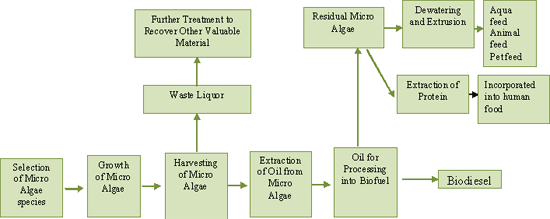Biodiesel from Algae (Euglena)
In BlogBiodiesel refers to any diesel-equivalent biofuel made from renewable biological materials such as vegetable oils or animal fats consisting of long-chain saturated hydrocarbons. It can be used in pure form (B100) or may be blended with petrodiesel at any concentration.
Algae to biodiesel has been widely discussed among experts in the petroleum industry and conservationist who are looking for a more reliable and safer source of energy that is both renewable and easy to attain.
One of the key reasons why algae are considered as feedstock for oil is their yields. DOE (Department of Energy, Gov of USA) has reported that algae yield 30 times more energy per acre than land crops such as soybeans, and some estimate even higher yields up to 15000 gallons per acre. Aside from keeping the earth clean and free form pollution, these algal biodiesel fuels help to utilize a resource that is available in abundance just waiting to be harnessed and exploited.
Once the algae are grown and harvested, there are a different ways of extracting the oil. Which ever method is used for extraction, the resulting product is a vegetable oil called ‘green crude’, similar to crude oil, which is further transformed into biodiesel fuel through a process called ‘transesterification’.
In this process the green crude is mixed with a catalyst, such as sodium hydroxide and an alcohol, such as methanol, resulting in biodiesel mixed with glycerol. The mixture is cleaned to remove the glycerol, a valuable by-product, leaving pure algal biodiesel fuel, which is similar to petrodiesel fuel. Although algal biodiesel and petro diesel are similar, there are a few significant differences between their properties.
Euglena, which means beautiful eyes, accumulates nutrients by photosynthesis, just like its 2 counterparts mentioned above. What’s distinctive about euglena is it will consume other micro-organisms when there’s insufficient sunlight, and it moves by wiggling like an animal. With a host of 59 nutrients found under its belt, euglena has inevitably been made into food products like tablets and low-calorie cookies. Research in Japan is set to discover other possible uses of euglena, one of them being bio-fuel.
Japanese oil company, Nippon Oil and Hitachi subsidiary Hitachi Plant Technologies have joined forces to develop jet fuel from a single celled pond and lake organism, Euglena. The company is trying to lower the cost of production to 80 cents a litre to make biofuel production competitive. The company says mass-producing Euglena-derived biofuel should be possible by 2015.

